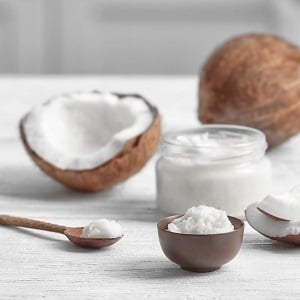
If natural beauty products had a prom, coconut oil would be queen this year. I mean, you can add it to desserts, use it as a great hair mask, and even apply it as a cuticle-softener. What more could you ask for?
Which begs the question: What would happen if you tried using coconut oil for acne?
First things first: What’s so special about coconut oil?
“Coconut oil is an edible oil extracted from the kernel or meat of mature coconuts,” says Dr Shari Marchbein, a New York City-based dermatologist. “It is 99% fat, composed mostly of saturated fats, with the most common being lauric acid.”
Lauric acid is a medium-chain fatty acid and has antibacterial and anti-inflammatory properties – both of which can be powerful weapons in the war against pimples.
There are a few ways acne-sufferers are using coconut oil for acne. “Most people using coconut oil topically are either using it to cleanse their skin as an oil cleanser, as a moisturiser, or as a spot treatment,” says Dr Shari Marchbein, a New York City-based dermatologist.
Read more: True or false: Coconut oil can help you grow out your hair
But is using coconut oil to fight acne really a good idea?
Uh, not necessarily.
There’s reason on the benefits of using lauric acid to treat acne – but most of those studies were conducted using pure lauric acid, as opposed to coconut oil, says Marchbein. “And lauric acid makes up only about 50% of the fats found in coconut oil,” she says. “This does not translate to efficacy of coconut oil in treating acne.”
In general, Marchbein would actually advise against using coconut oil to treat your acne, “given the high potential for coconut oil to clog pores and worsen acne”.
Still, Dr Joshua Zeichner, director of cosmetic and clinical research in dermatology at Mount Sinai Hospital in New York City, says coconut oil has its advantages. “For most people, coconut oil can be a useful addition to your traditional acne regimen,” he says, “but with the exception of perhaps the most mild acne, coconut oil by itself will likely not be effective.”
So, how can I use coconut oil on my skin?
One more time for the people in the back: “I would not recommend using coconut oil to treat acne as it is can act like a wax, sitting as a layer on top of the skin, suffocating and clogging pores, leading to significant acne breakouts,” says Marchbein. “At best, coconut oil may be useful for removing makeup, but I think even for that, my preference would be a gentle foaming cleanser or micellar water.”
If you’re going to use coconut oil as part of your cleansing routine, Dr Sejal Shah, founder of SmarterSkin Dermatology, says it’s important to remove all traces of the oil with a second cleanser. Since coconut oil is so comedogenic (a.k.a pore-clogging), you don’t want to leave any residue of it on skin, says Shah. This double-cleanse method allows you to reap the soothing benefits of coconut oil – without risking a huge honking breakout.
You should also continue to use your usual acne-fighting treatments, Zeichner says. “Because if its outstanding hydration benefits, coconut oil [could be a] great partner to topical retinoids, which are extremely effective in treating acne,” he says. That’s because retinoids are known to cause skin irritation – and coconut oil is a powerful moisturising agent.
This might seem counter-intuitive (after all, you’d think oily, zit-prone skin wouldn’t need hydration) but lots of other treatments used to treat acne are drying, which can strip skin of its natural oils. “Maintaining the integrity of the skin barrier is essential for not only acne treatment, but also helping the healing of acne lesions with minimal scarring,” says Houston, Texas dermatologist, Dr Jennifer M. Segal, of Metropolitan Dermatology Institute.
Dry skin takes longer to heal, and if you have acne on top of that, you might see more scarring. Nourished skin is then better able to tolerate acne-fighting ingredients like retinols, alpha and beta hydroxy acids, and benzoyl peroxide, which means clearer skin, too.
Read more: 6 things you’re doing that are causing your skin to break out badly
What kind of coconut oil should I buy?
New York City dermatologist Libby Rhee, of Craig + Austin Medi-Spa suggests looking for unrefined coconut oil. “It has a great balance of natural fatty acids, which can be effective as a moisturiser for healthy skin,” says Rhee. You’ll also want to make sure there’s no added fragrance, as perfume is a common trigger for acne and sensitive skin, adds Segal.
Tip: Look for a raw, organic virgin coconut oil, which means it’s both unrefined and very likely fragrance-free.
If you can’t use coconut oil for acne, what should you be using?
Acne treatments are not one size fits all, but Marchbein typically recommends looking for skincare products that are oil free and non-comedogenic. If you are breaking out, make sure to consult your dermatologist for a comprehensive acne routine.
“Most patients require a combination of prescription creams
including retinoids, like prescription Retin A or over the counter creams for
those with more mild breakouts, as well as benzoyl peroxide and topical
antibiotics,” says Marchbein. “In addition, for those who suffer from adult
female acne, oral contraceptive pills, as well as the anti-androgen pill
Spironolactone, can very effectively be used as a part of a treatment routine.”
This article was originally published on www.womenshealthmag.com
Image credit: iStock




 Publications
Publications
 Partners
Partners










